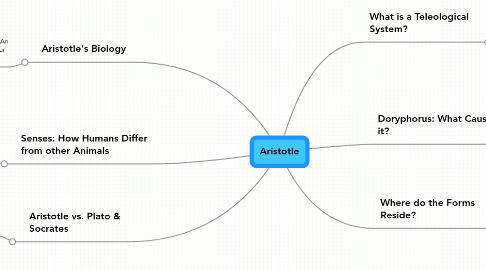
1. Aristotle's Biology
1.1. "All men by nature desire to know. An example is the delight we take in our senses."
1.1.1. Nature does nothing by chance; why would one have eyes if they were not meant to be used?
1.1.1.1. Our senses are the way to truth, the key to understanding the world.
1.1.1.1.1. To engage the problem of knowledge, we must utilize our senses.
2. Senses: How Humans Differ from other Animals
2.1. All life forms have nutritive, reproductive, and locomotive power.
2.1.1. Animals differ by having the power of sensation and perception.
2.1.1.1. More complex animals (not necessarily humans; i.e. beavers, dolphins) have intellectual power.
2.1.1.1.1. Aristotle argues that humans have a special intellectual power called reason, which is the ability to comprehend universals.
3. Aristotle vs. Plato & Socrates
3.1. Aristotle was a scientific and practical thinker
3.1.1. Did not believe in the world of forms, but he thinks that everything that we can understand are the things we can touch.
3.1.1.1. Creates and applies a scientific model to philosophical investigation (Poetics)
3.1.1.1.1. There are components that are essential for people to live a perfect life.
4. What is a Teleological System?
4.1. Everything in the world has causes (things that drive them to be created)
4.1.1. Material Cause: the material from which the thing is made
4.1.2. Formal Cause: the shape or form of a thing must take in order to be recognized
4.1.3. Efficient Cause: the actual force used to make a thing
4.1.4. Final Cause: what is the ultimate purpose of the thing?
5. Doryphorus: What Caused it?
5.1. Material Cause: marble (Roman copy)
5.2. Formal Cause: nude, male, human, warrior, intellectual
5.3. Efficient Cause: chisel and hammer, sandpaper
5.4. Final Cause: to teach and display perfection/Greek virtue (mathematical precision, strength, and reason controlling this strength)
5.4.1. Sets a role model; a young male in his prime defending the polis
6. Where do the Forms Reside?
6.1. Aristotle believes that the forms lie inside the things themselves (much like DNA)
6.1.1. Ex: The form of the Oak Tree is within the acorn
6.1.1.1. Each thing that we see is part of a teleological (goal-oriented) system
